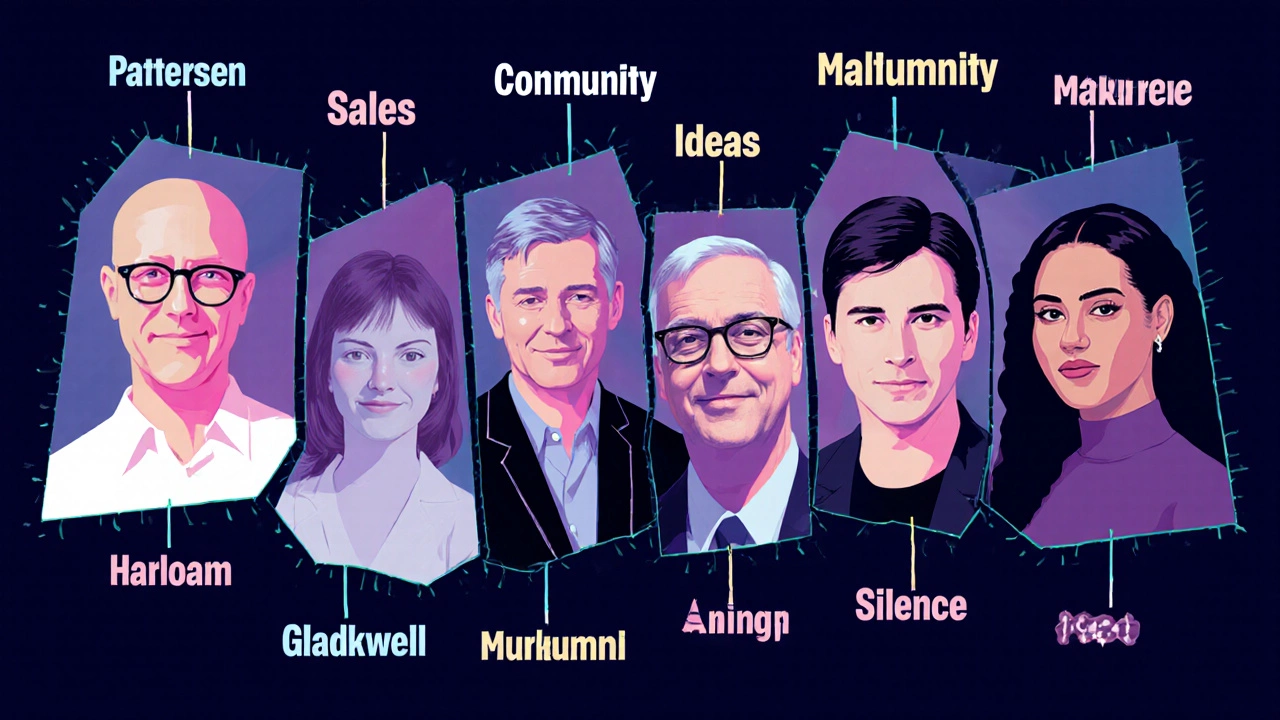Who Is the Most Successful Author Today? Top Sellers, Sales Data, and What Success Really Means
 Oct, 30 2025
Oct, 30 2025
Author Success Calculator
How successful is an author?
Success isn't just about sales numbers. Adjust the importance of different metrics to see which authors rise to the top based on your definition of success.
Success Metrics
Adjust the weight of each metric to see which author gets the highest score based on your values.
Why Metrics Matter
Different metrics highlight different aspects of success:
James Patterson wins on volume (400+ million books sold)
Colleen Hoover dominates cultural impact (TikTok shares, Netflix adaptations)
Malcolm Gladwell excels at longevity and intellectual influence
Haruki Murakami shows global reach without chasing trends
The article argues: "Success can mean selling over 100 million copies, turning readers into a movement, shaping public conversation for decades, changing the literary landscape, or building a global cult following without chasing trends."
Adjust the sliders to see which author wins under different definitions of success.
When people ask who the most successful author today is, they’re usually thinking about sales numbers. But success isn’t just about how many books you sell. It’s about reach, influence, longevity, and how deeply your work connects with readers across cultures and languages. If you’re looking for the single name that dominates shelves, streaming platforms, and global bestseller lists right now, the answer isn’t as simple as picking a name off a chart.
James Patterson Still Sells the Most Books
As of 2025, James Patterson holds the record for the most books sold by a living author. His output is staggering: over 400 million copies sold worldwide. He doesn’t write all of them himself-he works with a team of co-authors-but he’s the brand behind them. His Alex Cross, Women’s Murder Club, and Maximum Ride series are staples in airports, drugstores, and Kindle libraries. In 2024 alone, his books sold over 18 million copies globally. That’s more than the combined sales of Stephen King, John Grisham, and Gillian Flynn in the same year.
What makes Patterson’s model work isn’t just volume-it’s consistency. He releases multiple titles a year, often in different genres. He knows how to hook readers fast: short chapters, high stakes, no fluff. His books are designed for people who want to read on the train, before bed, or during lunch. He doesn’t write literary masterpieces. He writes books that get finished.
Colleen Hoover: The New Powerhouse of Emotional Storytelling
If Patterson dominates volume, Colleen Hoover dominates cultural momentum. Since 2020, her books have been the most borrowed from public libraries in the U.S. and the most sold on Amazon. In 2024, she had six books in the top 10 of Amazon’s overall bestseller list at the same time. That’s never happened before.
Her novels-It Ends with Us, Verity, Ugly Love-aren’t just popular. They’re shared. Millions of readers post about them on TikTok, Instagram, and book clubs. Her stories tap into raw emotions: trauma, love, resilience, moral ambiguity. She writes for women aged 18-45, but her audience is growing beyond that. Her books are translated into 50+ languages. In 2025, Netflix adapted three of her novels into films, each becoming top-10 global hits within weeks.
Hoover’s success isn’t just about sales. It’s about community. Her readers don’t just buy her books-they become evangelists. She doesn’t do traditional book tours. She does live Q&As on Instagram. She responds to DMs. She makes readers feel seen.
Malcolm Gladwell: The Nonfiction Giant
When you think of nonfiction bestsellers, Malcolm Gladwell is still the name that comes up. His books-The Tipping Point, Blink, Outliers-are still selling over 1.2 million copies a year, even though the first was published in 2000. He doesn’t write about politics or self-help. He writes about the hidden patterns in everyday life: why some ideas spread, why some people succeed, why we make snap judgments.
His influence stretches far beyond bookstores. His podcast, Revisionist History, has over 100 million downloads. His ideas are cited in corporate training programs, university courses, and TED Talks. He’s not a flashy writer. He doesn’t shout. He asks questions. And he makes you rethink what you thought you knew.
In 2025, his latest book, The Bomber Mafia, hit #1 on the New York Times nonfiction list and stayed there for 14 weeks. That’s rare for a nonfiction book in a crowded market.

What Does ‘Success’ Really Mean?
Here’s the problem with asking who the most successful author is: success isn’t one thing. Patterson wins on volume. Hoover wins on cultural impact. Gladwell wins on intellectual influence. Then there are others who don’t make headlines but are just as powerful in their own way.
Haruki Murakami sells 3 million copies a year outside Japan. His books are quiet, strange, and haunting. He doesn’t tweet. He doesn’t do interviews. He doesn’t need to. His readers are devoted. In 2024, his novel The City and Its Uncertain Walls broke pre-order records in 17 countries.
On the other side, authors like Angie Thomas (The Hate U Give) and Ocean Vuong (On Earth We’re Briefly Gorgeous) are reshaping literature with voices that were once ignored. Their books are taught in schools, adapted into films, and used in social justice movements. They don’t sell millions, but they change how people think.
Success can mean:
- Selling over 100 million copies (Patterson)
- Turning readers into a movement (Hoover)
- Shaping public conversation for decades (Gladwell)
- Changing the literary landscape (Thomas, Vuong)
- Building a global cult following without chasing trends (Murakami)
There’s no single winner. There are different kinds of success-and each one matters.
Why the Numbers Can Be Misleading
Amazon rankings don’t tell the whole story. Patterson’s books are often sold in bulk-by libraries, book clubs, schools, and discount retailers. One retailer might buy 5,000 copies of his latest thriller. That’s one sale in the system, but it’s 5,000 readers. Hoover’s books? Mostly individual purchases. People buy them because they can’t stop talking about them.
Also, ebook sales and audiobooks are now bigger than print. Hoover’s audiobooks are narrated by her, and they’ve become the most downloaded fiction titles on Audible. Patterson’s are narrated by professionals and outsourced. The way people consume books has changed. The author who wins in 2025 isn’t necessarily the one who sells the most paperbacks.
And then there’s the global picture. In India, Chetan Bhagat sells more books than any English-language author. In Brazil, Paulo Coelho still outsells everyone. In China, Liu Cixin’s The Three-Body Problem trilogy has sold over 20 million copies since its English translation in 2014. But you won’t see them on the New York Times list.

Who Will Be the Next Big Name?
Look at the rising stars: Naoise Dolan, whose debut Exciting Times became a global phenomenon among Gen Z readers. Brit Bennett, whose The Vanishing Half is now a staple in college syllabi. And Yaa Gyasi, whose Homegoing continues to sell steadily over a decade after publication.
What these authors have in common? They write books that make readers feel less alone. They don’t chase trends. They write what they need to say-and the world catches up.
Final Thought: Success Is a Mirror
When you ask who the most successful author today is, you’re really asking what kind of story you want to believe in. Do you want the machine that never stops producing? The voice that speaks to your pain? The mind that changes how you see the world? Or the quiet genius who writes in solitude and still moves millions?
There’s no single answer. But if you’re looking for the one author who hits every metric-sales, adaptation, cultural reach, and reader loyalty-then Colleen Hoover is the closest thing we have to a modern phenomenon. She didn’t just write books. She built a movement. And that’s the kind of success that lasts longer than any bestseller list.
Is James Patterson still the top-selling author in 2025?
Yes, James Patterson remains the top-selling living author in 2025, with over 400 million copies sold worldwide. He sells an average of 18 million copies annually, mostly through his series-driven, co-authored books. No other living author comes close in raw sales volume.
Who has the biggest cultural impact right now?
Colleen Hoover has the biggest cultural impact. Her books dominate social media, especially TikTok, where readers share emotional reactions and book club discussions. Three of her novels were adapted into Netflix films in 2025, all reaching the global top 10. She’s not just selling books-she’s creating a community.
Do book sales include audiobooks and ebooks?
Yes, modern sales figures include audiobooks and ebooks. In fact, audiobooks now make up over 30% of fiction sales in the U.S. and U.K. Colleen Hoover’s audiobooks, narrated by her, are among the top-selling on Audible. Publishers report combined digital and print sales when claiming "total copies sold."
Why isn’t Stephen King on this list?
Stephen King is still one of the most respected and widely read authors, with over 350 million books sold. But his annual sales have slowed compared to the 2010s. He releases fewer books now and doesn’t rely on co-authors. While his legacy is unmatched, his current output doesn’t match the sales velocity of Patterson or Hoover in 2025.
Are nonfiction authors as successful as fiction writers?
Malcolm Gladwell proves they can be. His books sell over a million copies a year, and his podcast has over 100 million downloads. Nonfiction doesn’t usually top bestseller lists by volume, but when it does-like Gladwell’s or Yuval Noah Harari’s-it shapes public thinking for years. Success isn’t always about numbers-it’s about influence.
What to Read Next
If you’re curious about who’s next, start with Naoise Dolan’s Interesting Times or Yaa Gyasi’s Transcendent Kingdom. Both are quietly changing the literary scene. If you want to see how a single book can become a global event, read The Seven Husbands of Evelyn Hugo by Taylor Jenkins Reid-it’s still selling over 500,000 copies a year, seven years after release.
Success in writing isn’t about being the loudest. It’s about being the one that stays with people long after they turn the last page.